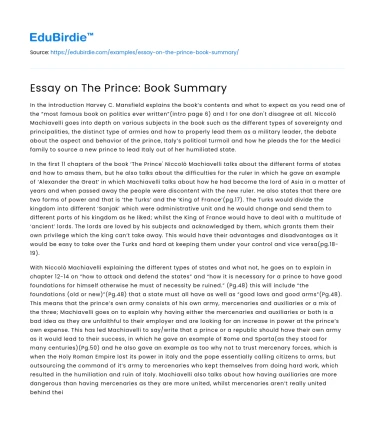In the introduction Harvey C. Mansfield explains the book’s contents and what to expect as you read one of the “most famous book on politics ever written”(intro page 6) and I for one don't disagree at all. Niccolò Machiavelli goes into depth on various subjects in the book such as the different types of sovereignty and principalities, the distinct type of armies and how to properly lead them as a military leader, the debate about the aspect and behavior of the prince, Italy’s political turmoil and how he pleads the for the Medici family to source a new prince to lead Italy out of her humiliated state.
In the first 11 chapters of the book ‘The Prince' Niccolò Machiavelli talks about the different forms of states and how to amass them, but he also talks about the difficulties for the ruler in which he gave an example of ‘Alexander the Great’ in which Machiavelli talks about how he had become the lord of Asia in a matter of years and when passed away the people were discontent with the new ruler. He also states that there are two forms of power and that is ‘the Turks’ and the ‘King of France’(pg.17). The Turks would divide the kingdom into different ‘Sanjak’ which were administrative unit and he would change and send them to different parts of his kingdom as he liked; whilst the King of France would have to deal with a multitude of ‘ancient’ lords. The lords are loved by his subjects and acknowledged by them, which grants them their own privilege which the king can’t take away. This would have their advantages and disadvantages as it would be easy to take over the Turks and hard at keeping them under your control and vice versa(pg.18-19).
Save your time!
We can take care of your essay
- Proper editing and formatting
- Free revision, title page, and bibliography
- Flexible prices and money-back guarantee
With Niccolò Machiavelli explaining the different types of states and what not, he goes on to explain in chapter 12-14 on “how to attack and defend the states” and “how it is necessary for a prince to have good foundations for himself otherwise he must of necessity be ruined.” (Pg.48) this will include “the foundations (old or new)”(Pg.48) that a state must all have as well as “good laws and good arms”(Pg.48). This means that the prince’s own army consists of his own army, mercenaries and auxiliaries or a mix of the three; Machiavelli goes on to explain why having either the mercenaries and auxiliaries or both is a bad idea as they are unfaithful to their employer and are looking for an increase in power at the prince’s own expense. This has led Machiavelli to say/write that a prince or a republic should have their own army as it would lead to their success, in which he gave an example of Rome and Sparta(as they stood for many centuries)(Pg.50) and he also gave an example as too why not to trust mercenary forces, which is when the Holy Roman Empire lost its power in italy and the pope essentially calling citizens to arms, but outsourcing the command of it’s army to mercenaries who kept themselves from doing hard work, which resulted in the humiliation and ruin of Italy. Machiavelli also talks about how having auxiliaries are more dangerous than having mercenaries as they are more united, whilst mercenaries aren’t really united behind their own leaders.
Chapter 15-23 will be a subject that Niccolò Machiavelli will cover for nearly the rest of his book, and it will be about ‘how a prince should act’ and that is being stern and bad at times but not always, as it could lead to ruin, which could also happen if the prince was too nice also. If a prince wants to show people he is generous, he should as Machiavelli puts it “it is necessary not to leave out any kind of lavish display”(Pg.63) this is how he could raise taxes to get more money from his citizens and subjects; but this does come with a drawback as the people may grow to hate him, but he will be holding onto his own wealth which is a good thing. A prince should also be feared as this will keep the people in check and have faith, Machiavelli gives an example of “Cesare Borgia” who was described as “cruel”(Pg.65) was responsible for uniting Romagna and had peace and order restored. Machiavelli goes on to discuss the topic of assination in which he talks about how a prince should have a good relationship with the lords and nobles, as to not be hated and despised, which could lead to his death. The prince should also have a number of approaches to keep and maintain his power, and there are a number of ways that a prince could lose the faith of his citizens and that is disarming them, building fortresses in the city and encouraging the opposing factions to fight each other could make the prince be viewed as weak and apprehensive.
In the last few chapters Niccolò Machiavelli talks about how if the prince has followed all of the things he has said, the prince will be secure like a hereditary ruler and should not be taken for granted, as an incompetence will lead to being disgraced. But in the next chapter Machiavelli talks about how fortune and free will and how a prince should always consider ways to coax lady fortune help and how if the Medici family follows the outline of things that Machiavelli has written then they will be able to rescue Italy out of the turmoil that they are currently in, as if the Medici family takes up the cause they would be able to make Italy great again.






 Stuck on your essay?
Stuck on your essay?

